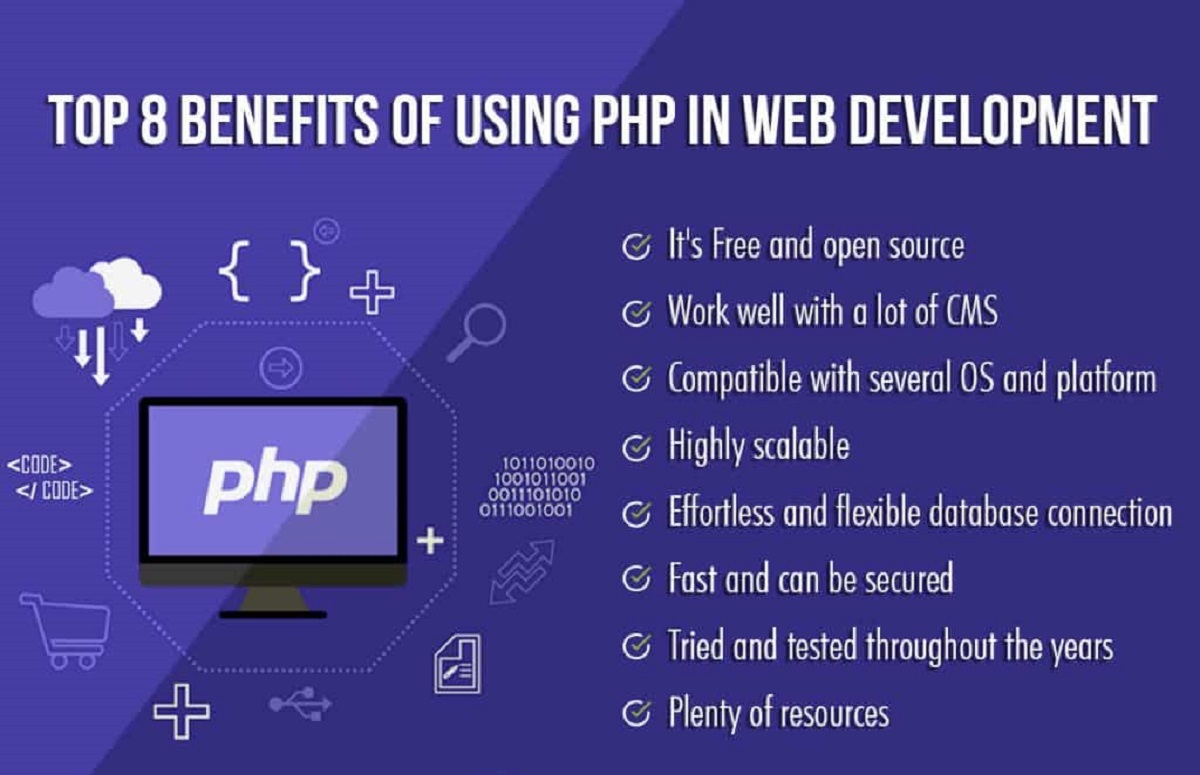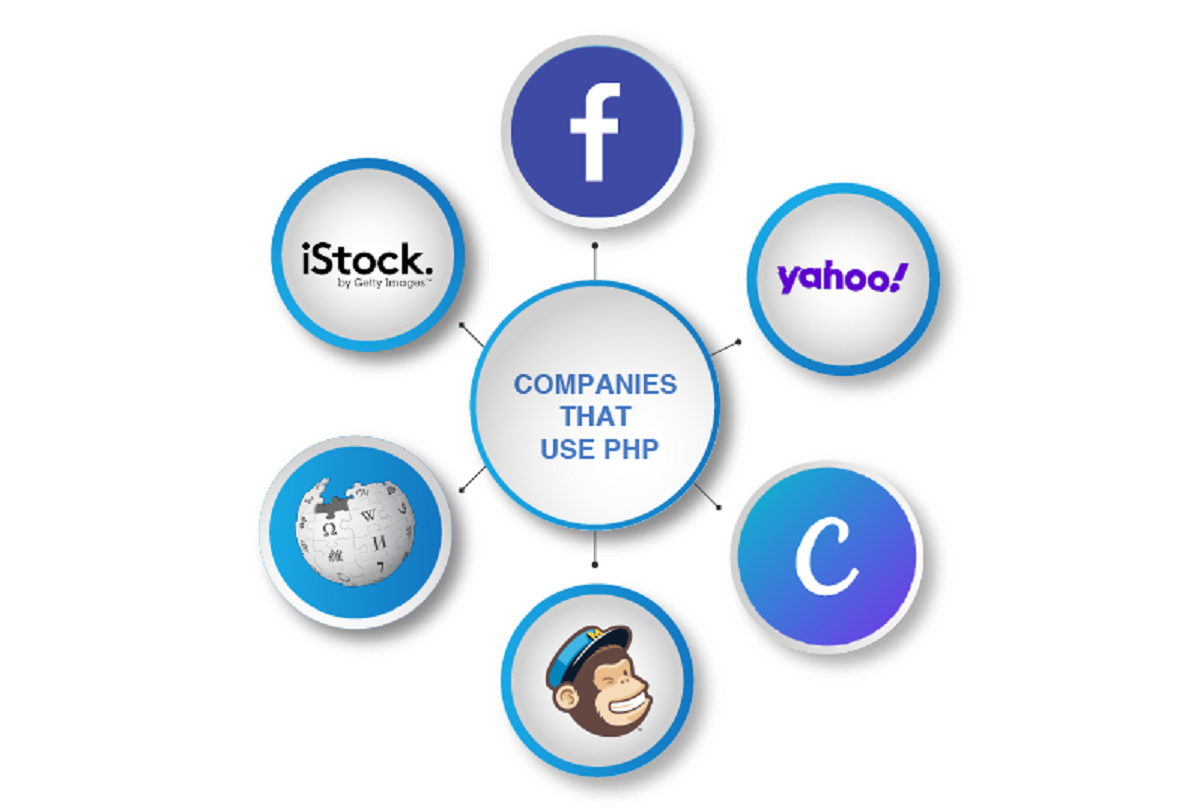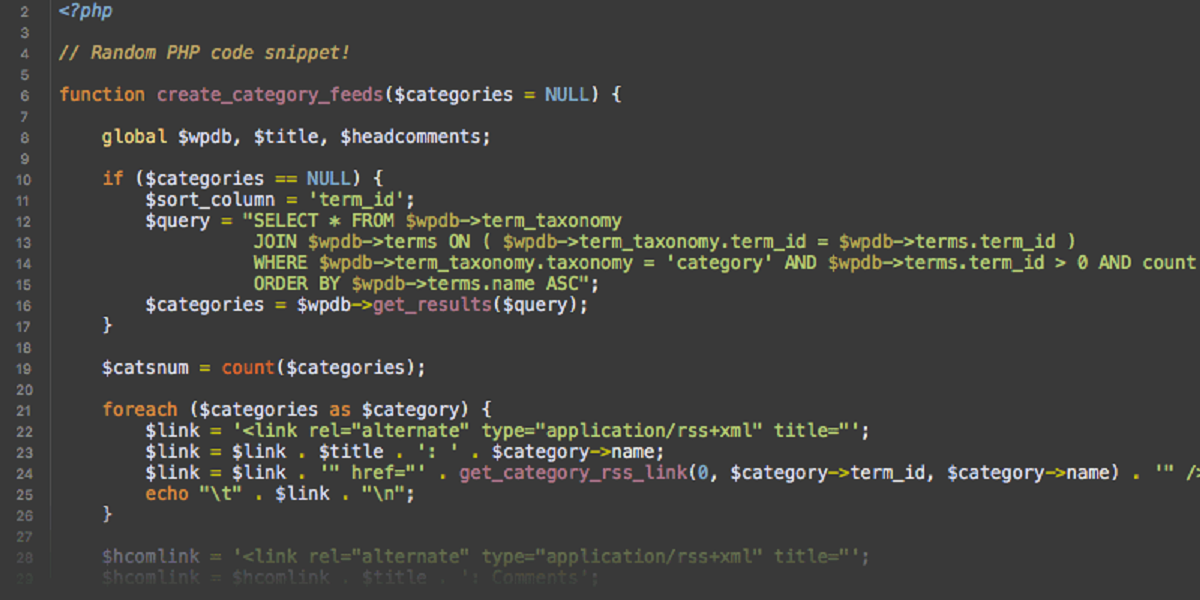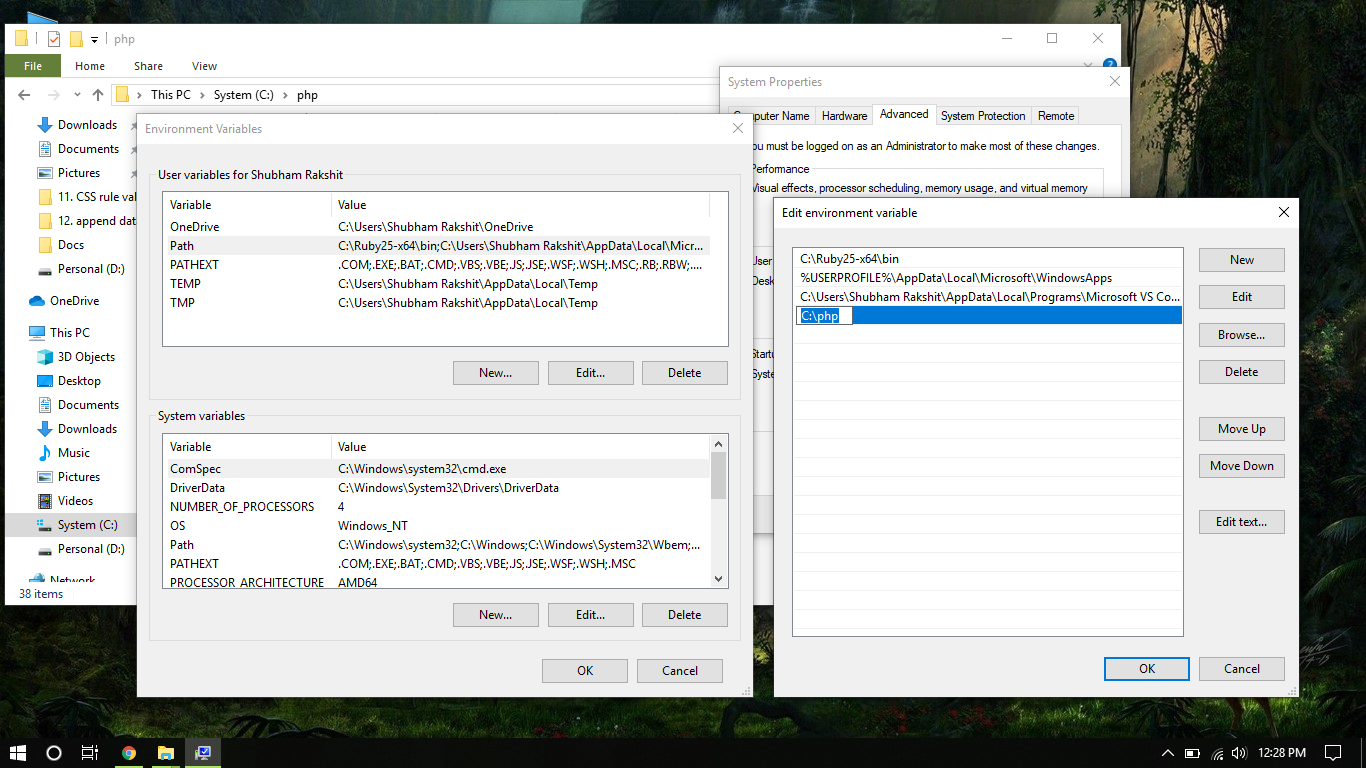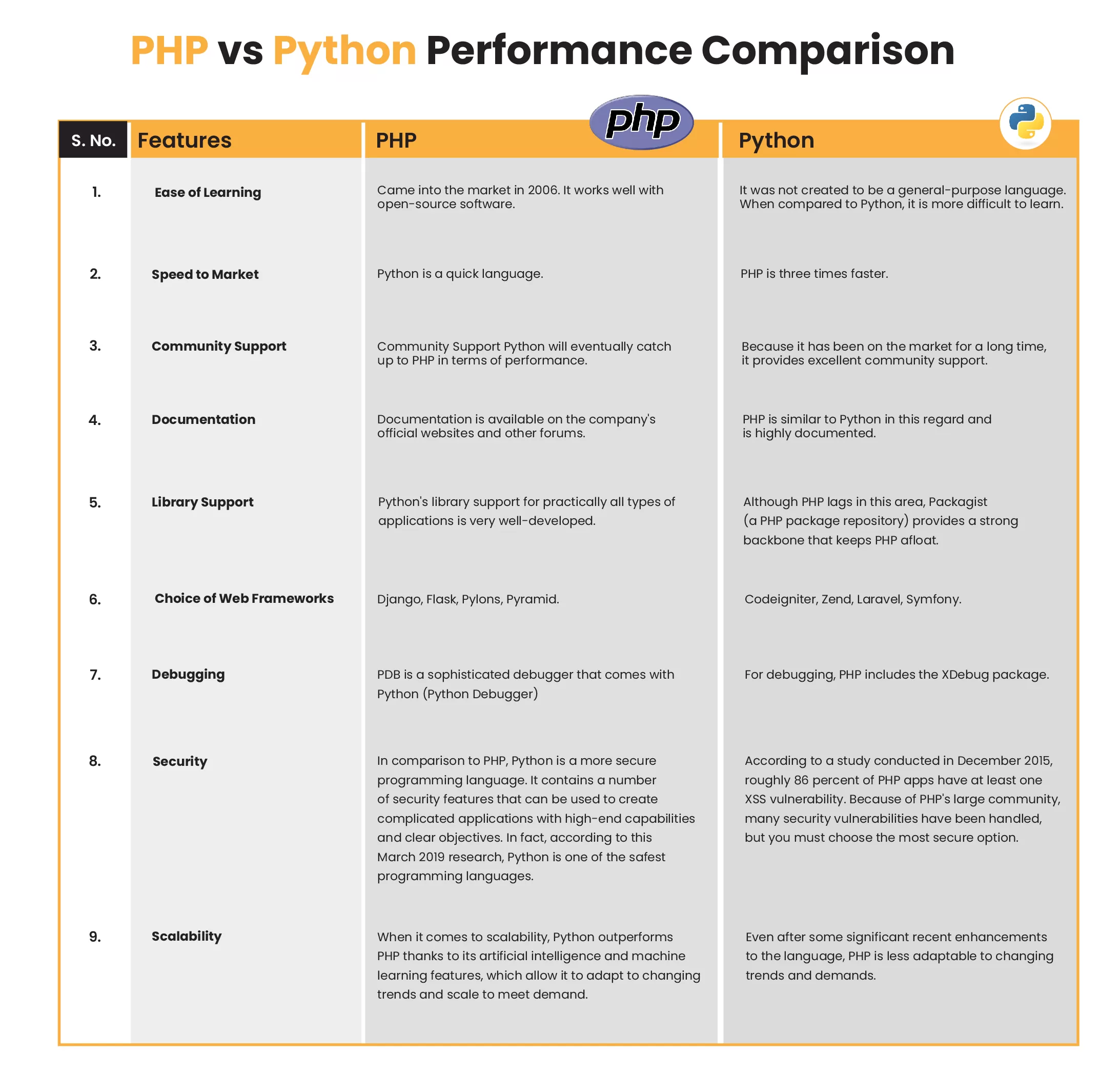Introduction
When it comes to web development, PHP is a key player in the world of server-side scripting languages. With its versatility and wide range of applications, PHP has become a popular choice for developers in creating dynamic and interactive websites. Whether you’re building a simple blog or a complex e-commerce platform, PHP offers the tools and functionalities to bring your vision to life.
PHP, which stands for Hypertext Preprocessor, is an open-source scripting language that can be embedded in HTML. It is designed to be easy to learn and use, making it accessible to both experienced developers and beginners. Initially developed in 1994, PHP has evolved and matured over the years, becoming a robust and reliable language for website development.
One of the primary reasons PHP is widely used in web development is its ability to seamlessly interact with databases. PHP supports a variety of database systems, including MySQL, PostgreSQL, and Oracle, allowing developers to create dynamic websites with ease. Additionally, PHP offers a wealth of built-in functions and libraries, making it efficient and time-saving when it comes to handling various tasks, such as form processing, file management, and data manipulation.
Moreover, PHP has a large and active community of developers who contribute to its growth and continuous improvement. This means that you can find extensive documentation, tutorials, and resources online, which makes learning and troubleshooting PHP-related issues more accessible.
In this article, we will delve deeper into the many applications of PHP in web development. From its role in creating database-driven web applications to its use in e-commerce development and content management systems, PHP offers a versatile solution for a wide range of web development projects. So, let’s explore the different aspects of PHP and see why it continues to be a favorite among web developers.
PHP as a Server-Side Scripting Language
PHP serves as a powerful server-side scripting language, meaning it runs on the server before the web page is sent to the user’s browser. This allows for dynamic content generation and customized interactions between the user and the website.
One of the main advantages of using PHP as a server-side scripting language is its compatibility with various operating systems and web servers. PHP supports platforms like Windows, macOS, Linux, and can be easily integrated with popular web servers like Apache and Nginx. This flexibility ensures that PHP can be deployed in a wide range of hosting environments, making it accessible to developers regardless of their preferred infrastructure.
PHP’s ease of integration with HTML is another reason why it is favored in web development. Developers can embed PHP code directly into HTML pages, utilizing tags such as to execute PHP statements. This seamless integration allows for the creation of dynamic web pages that can generate content based on user input or external data sources.
Moreover, PHP offers a plethora of built-in functions and libraries that streamline web development tasks. From simple tasks like form validation and file handling to advanced operations like image manipulation and encryption, PHP provides developers with the tools necessary to build robust and feature-rich websites. Additionally, PHP’s vast extension ecosystem allows for easy integration with third-party libraries and frameworks, further expanding its capabilities.
Furthermore, PHP’s ability to handle different data types and interact with databases makes it a popular choice for developing database-driven web applications. With support for databases such as MySQL, PostgreSQL, and Oracle, PHP empowers developers to retrieve, store, and manipulate data seamlessly within their applications.
In summary, PHP’s role as a server-side scripting language provides developers with a powerful toolset to create dynamic and interactive web applications. Its compatibility with various operating systems, seamless integration with HTML, extensive built-in functions, and database interaction capabilities make PHP a versatile language for web development. Whether you’re building a small personal website or a large-scale web application, PHP ensures the smooth delivery of customized content and enhanced user experiences.
Web Development with PHP
PHP has established itself as a go-to language for web development due to its wide range of features and capabilities. It offers developers the flexibility to build websites of various complexities, from simple blogs to robust e-commerce platforms. Let’s explore how PHP is used in web development.
First and foremost, PHP provides a straightforward way to interact with user input through web forms. Developers can easily retrieve data submitted by users and process it with PHP. Whether it’s validating form fields, sanitizing input, or handling file uploads, PHP makes it seamless to work with user-generated data.
Another key aspect of web development with PHP is the ability to manage sessions and cookies. PHP provides built-in functions to handle session management, allowing developers to store user-specific data across multiple requests. This is crucial for creating personalized user experiences, such as maintaining shopping carts in e-commerce websites or implementing user authentication systems.
PHP’s versatility is further demonstrated in its support for various web protocols, including HTTP, FTP, and IMAP. This allows developers to incorporate external resources, such as fetching data from remote APIs or sending emails from within their PHP applications.
In addition to its core functionalities, PHP offers an extensive ecosystem of frameworks, such as Laravel, Symfony, and CodeIgniter, which streamline the web development process. These frameworks provide ready-to-use components and libraries, helping developers build scalable and maintainable applications more efficiently.
Furthermore, PHP plays a vital role in creating dynamic content and generating HTML on the fly. With PHP, developers can separate the presentation layer from the logic, adopting the Model-View-Controller (MVC) architectural pattern. This separation enhances code organization and reusability, making it easier to update and maintain the website over time.
PHP also excels in integrating with databases, allowing developers to interact with data and store information securely. With support for various database management systems, PHP can be used to perform tasks like querying data, inserting records, or updating information in a database.
In summary, PHP empowers developers to create dynamic and interactive websites that handle user input, manage sessions, interact with web protocols, and integrate with databases. Its vast ecosystem of frameworks, separation of concerns, and robust functionality make PHP a popular choice for web development projects of all sizes and complexities.
PHP Frameworks and CMS
In the world of web development, PHP frameworks and Content Management Systems (CMS) are essential tools that streamline the development process, increase efficiency, and enhance code reusability. Let’s explore how PHP frameworks and CMS can benefit web developers.
PHP frameworks, such as Laravel, Symfony, and CodeIgniter, provide a structured approach to web development. These frameworks offer a set of pre-built libraries, modules, and functionalities that help developers build web applications rapidly. They promote code organization and enforce best practices, making it easier to maintain and scale projects over time. With MVC (Model-View-Controller) architecture, PHP frameworks separate the presentation layer from the business logic, allowing developers to focus on building robust applications.
PHP frameworks offer features such as routing, URL mapping, and dependency injection, simplifying complex tasks and reducing the amount of boilerplate code. They also provide built-in security measures, such as input validation, CSRF protection, and password hashing, helping developers ensure the safety of their web applications.
Content Management Systems (CMS) built with PHP, such as WordPress, Joomla, and Drupal, offer a user-friendly interface for managing website content. These CMS platforms allow developers and non-technical users alike to effortlessly create, update, and organize website content without the need for extensive coding. PHP-based CMS offers a wide range of themes, plugins, and extensions that can be easily integrated into websites to enhance functionality and design.
PHP CMS platforms provide a flexible and scalable framework for building websites of all sizes, from simple blogs to enterprise-level portals. They typically include features like user management, search engine optimization, content versioning, and multi-language support. As a result, PHP CMS makes it easier to create dynamic and interactive websites with minimal custom coding.
Whether utilizing PHP frameworks or CMS, developers can significantly reduce development time by leveraging existing components and functionalities. This allows development teams to focus on building unique features and customizations instead of reinventing the wheel. The rich ecosystems surrounding PHP frameworks and CMS also mean that developers can tap into a vast community of contributors, who actively develop plugins, provide support, and share best practices.
In summary, PHP frameworks and CMS offer developers powerful tools to expedite web development, enhance code organization, and improve project scalability. By leveraging these frameworks and CMS platforms, developers can build web applications efficiently and focus on delivering exceptional user experiences.
PHP in Database-Driven Web Applications
One of PHP’s key strengths is its seamless integration with databases, making it a popular choice for developing database-driven web applications. PHP provides robust support for various database management systems, such as MySQL, PostgreSQL, and Oracle, allowing developers to easily interact with and manipulate data within their applications.
In a database-driven web application, PHP acts as the bridge between the user interface and the database. It handles tasks like retrieving data from the database, updating records, and storing new information. With PHP, developers can execute SQL queries and fetch results, making it efficient to display dynamic content on web pages.
PHP’s database support includes features like database connections, query execution, and result handling. Developers can establish a secure connection to the database using PHP extensions and libraries, and perform CRUD operations (Create, Read, Update, Delete) to interact with data. With PHP’s ability to handle different data types, developers can efficiently manage various types of data in the database.
Additionally, PHP incorporates features like prepared statements and parameter binding to prevent SQL injection attacks, ensuring the security of database operations. These features help sanitize user input and safeguard against malicious attempts to manipulate the database.
PHP frameworks, such as Laravel and CodeIgniter, offer database abstraction layers, which simplify database interactions and enhance code readability. These abstraction layers provide an object-oriented approach to database operations, allowing developers to define models and perform database operations using high-level methods and syntax.
Furthermore, PHP’s integration with databases enables developers to build advanced database-driven functionalities like user authentication, data validation, and data manipulation. By combining PHP with SQL, developers can create complex queries to retrieve specific data, perform aggregations, or join multiple tables together. This ability makes PHP a powerful tool for creating custom reporting systems, data analysis applications, and content management systems.
In summary, PHP’s ability to effortlessly connect and interact with databases makes it an ideal choice for building database-driven web applications. With its robust database support, PHP enables developers to create dynamic and responsive web applications, effectively manage data, and implement complex database functionalities.
PHP in E-commerce Development
In the world of online business, e-commerce platforms have become increasingly popular, and PHP plays a crucial role in their development. PHP’s versatility, database integration, and vast ecosystem of frameworks and libraries make it an ideal choice for building robust and scalable e-commerce applications.
One of the key advantages of using PHP in e-commerce development is its ability to handle complex transactional processes securely. PHP provides a range of built-in functions and extensions to process payments, calculate taxes, generate invoices, and manage order fulfillment. These functionalities, combined with PHP’s database integration, allow developers to create seamless shopping experiences for customers.
PHP frameworks, such as Magento, WooCommerce, and OpenCart, are specifically designed for e-commerce development and provide comprehensive solutions for online stores. These frameworks offer powerful features like product catalog management, inventory tracking, customer relationship management, and marketing tools, which simplify the development and management of e-commerce websites.
Additionally, PHP frameworks for e-commerce often have built-in security measures, such as protection against common e-commerce vulnerabilities like cross-site scripting (XSS) and cross-site request forgery (CSRF). This helps ensure the security and integrity of online transactions, minimizing the risk of fraudulent activities.
Another advantage of using PHP in e-commerce development is its integration with popular payment gateways. PHP offers native support for integrating with payment gateways like PayPal, Stripe, and Authorize.net, enabling seamless and secure transactions between customers and online stores. The versatility of PHP allows developers to implement various payment options, such as credit card payments, digital wallets, and bank transfers, to cater to the diverse needs of customers.
Furthermore, PHP’s scalability makes it an excellent choice for growing e-commerce businesses. With PHP, developers can easily add new features, expand product catalogs, and handle increasing website traffic. PHP frameworks provide modular architecture, allowing developers to extend the functionality of e-commerce platforms by integrating third-party plugins and extensions.
Lastly, PHP’s extensive community and documentation support contribute to its popularity in e-commerce development. With a large community of developers actively contributing to the PHP ecosystem, finding resources, tutorials, and solutions to common e-commerce challenges is easier than ever.
In summary, PHP’s versatility, database integration, security features, and extensive ecosystem make it a powerful tool for e-commerce development. PHP provides developers with the necessary tools to create secure, scalable, and feature-rich e-commerce applications that deliver exceptional shopping experiences for customers.
PHP in Content Management Systems
Content Management Systems (CMS) have revolutionized the way websites are created and managed, and PHP plays a significant role in powering many popular CMS platforms. PHP’s characteristics, such as ease of use, flexibility, and database integration, make it an ideal choice for building robust and dynamic CMS solutions.
PHP-based CMS platforms, such as WordPress, Joomla, and Drupal, offer intuitive interfaces and a wide range of features that simplify content creation and management. These CMS platforms allow users with limited technical knowledge to create and update website content without the need for coding skills.
PHP’s seamless integration with databases allows CMS platforms to efficiently store and retrieve content from the database. With PHP, CMS platforms can provide users with features such as dynamic page generation, content versioning, and user management. PHP’s database integration also enables administrators to create custom database queries and retrieve specific data for content personalization and customization.
Furthermore, PHP’s extensibility makes it easy to extend the functionality of CMS platforms. PHP-based CMS platforms provide extensive plugin and theme repositories, offering a wealth of options for customization and enhancement. Developers can utilize PHP to create custom plugins and themes, add new features, and modify existing functionalities to tailor the CMS to specific requirements.
PHP’s versatility also enables the seamless integration of various third-party services and APIs into CMS platforms. Developers can integrate social media platforms, e-commerce solutions, analytics tools, and other external services to enhance the functionality and user experience of CMS-driven websites.
PHP’s active community and extensive developer documentation play a vital role in the popularity and success of PHP-based CMS platforms. The vast community provides support, guides, and resources that enable developers to solve problems, share best practices, and continuously improve the CMS platforms.
Moreover, PHP-based CMS platforms offer a wide array of themes and templates, allowing users to create visually stunning websites without intricate design skills. Developers can leverage PHP to build custom themes that adhere to specific branding guidelines and provide unique user experiences.
In summary, PHP’s ease of use, flexibility, database integration, and extensibility make it an ideal choice for building content management systems. PHP-based CMS platforms provide users with a user-friendly interface, efficient content management capabilities, and a thriving ecosystem of plugins and themes. Whether it’s a personal blog, corporate website, or e-commerce store, PHP-powered CMS platforms offer a powerful solution for managing website content effectively.
PHP in Data Processing
PHP’s versatility extends beyond web development, as it is also an efficient language for handling data processing tasks. Whether it’s manipulating data, parsing files, or performing complex calculations, PHP provides developers with a range of functions and libraries to process and analyze data effectively.
One of the primary advantages of using PHP in data processing is its extensive file handling capabilities. PHP offers built-in functions to read and write files in various formats, such as CSV, XML, and JSON. This makes it easy to import data from external sources, process it, and export it in different formats.
In addition to file handling, PHP supports regular expressions, making it a powerful tool for pattern matching and extracting information from unstructured data. Developers can use regular expressions with PHP functions to validate data, parse text, and extract specific content from strings.
Furthermore, PHP provides functions for data transformation, manipulation, and conversion. From simple tasks such as string manipulation and number formatting to more complex operations like date parsing and time calculations, PHP offers a wide range of functions to handle diverse data processing requirements.
PHP’s integration with databases further enhances its data processing capabilities. With support for various database management systems, developers can perform data transformations and calculations directly within the database using SQL queries. PHP allows developers to retrieve data from the database, process it using PHP functions, and update the database with the modified results.
PHP frameworks and libraries also contribute to data processing tasks. Frameworks like Laravel and CodeIgniter provide data modeling and query building functionalities, simplifying database interactions and data processing operations. Additionally, PHP libraries like PhpSpreadsheet and TCPDF offer advanced features for handling spreadsheet data and generating PDF documents, respectively.
Moreover, PHP incorporates features for handling data validation and sanitization, ensuring the integrity and security of processed data. With PHP’s filtering and validation functions, developers can validate user input, sanitize data to prevent SQL injection and cross-site scripting attacks, and ensure the accuracy and consistency of processed data.
In summary, PHP’s extensive file handling capabilities, support for regular expressions, data transformation functions, and database integration make it a reliable language for data processing tasks. Whether it’s parsing files, transforming and manipulating data, or performing complex calculations, PHP provides developers with the tools and libraries necessary to process data efficiently and securely.
PHP in Application Development
PHP is not only limited to web development but also serves as a powerful language for building various types of applications. From command-line utilities to desktop applications, PHP offers developers a versatile toolset for application development.
One of the main advantages of using PHP in application development is its ease of use and rapid development capabilities. PHP provides a straightforward syntax and a wide range of built-in functions and libraries that simplify common development tasks. This allows developers to quickly prototype and develop applications, reducing time-to-market and increasing productivity.
PHP can be used to build command-line applications that perform tasks like data processing, batch operations, or system administration. With PHP’s efficient file handling, database integration, and support for command-line arguments, developers can create powerful command-line utilities to automate routine tasks or perform complex operations.
PHP frameworks like Laravel and Symfony extend PHP’s application development capabilities by providing features for developing robust, scalable, and maintainable applications. These frameworks offer built-in modules for route handling, database interaction, user authentication, and more. Moreover, they promote software architecture patterns like MVC (Model-View-Controller), allowing developers to organize code and separate concerns.
PHP can also be used for developing cross-platform desktop applications using frameworks like PHP-GTK or the Electron framework with PHP as the backend. These frameworks allow developers to leverage their PHP skills to create desktop applications that integrate with system resources and provide users with a native-like experience.
PHP’s compatibility with different operating systems enables developers to deploy applications on various platforms, including Windows, macOS, and Linux. This flexibility ensures that PHP applications can reach a wide audience and cater to diverse user environments.
Additionally, PHP’s integration with databases plays a significant role in application development. Developers can efficiently retrieve, manipulate, and store data in databases using PHP functions and SQL queries. This allows for the development of data-driven applications that rely on reliable data storage and retrieval.
Moreover, PHP’s vibrant community contributes to its success in application development. The PHP community provides extensive documentation, a vast collection of libraries and frameworks, and support through forums and online resources. This ecosystem enables developers to leverage existing solutions, collaborate with peers, and continuously improve their PHP applications.
In summary, PHP’s ease of use, rapid development capabilities, compatibility with different platforms, and database integration make it an effective choice for application development. Whether it’s command-line utilities, desktop applications, or cross-platform solutions, PHP provides developers with the tools necessary to build robust and feature-rich applications.
PHP in Web Services and APIs
With the increasing demand for web services and APIs, PHP has become a popular choice for building and consuming APIs due to its versatile functionality, ease of use, and robust integration capabilities. PHP’s extensive library support and built-in features make it a powerful tool for creating and interacting with web services and APIs.
When it comes to building web services and APIs, PHP offers a wide range of frameworks, such as Laravel, Slim, and Lumen, that simplify the development process. These frameworks provide built-in functionalities for routing, request handling, response formatting, and authentication, making it easier for developers to create RESTful or SOAP APIs.
PHP’s support for HTTP methods, headers, and response codes enables developers to build APIs that adhere to industry standards and facilitate seamless integration with other applications. Whether it’s retrieving data from a database, integrating with external services, or generating and serving dynamic content, PHP-based APIs provide a robust solution for exchanging data between applications.
PHP’s versatility also allows it to consume external APIs efficiently. With built-in functions like cURL and libraries like Guzzle, PHP can easily make HTTP requests, handle responses, and parse data from external APIs. This capability enables developers to integrate third-party services or retrieve data from various sources to enhance their own applications.
Furthermore, PHP’s support for different data formats, such as JSON and XML, makes it easy to handle data exchange and format responses according to API requirements. PHP provides functions to encode or decode data in different formats, ensuring compatibility and seamless communication between different systems.
PHP’s database integration further extends its capabilities in building web services and APIs. Developers can seamlessly connect APIs to databases, retrieve data, and serve it to client applications in a structured and secure manner. PHP’s ability to execute complex SQL queries, handle transactions, and sanitize user input ensures the integrity and security of data accessed through APIs.
PHP’s active developer community and extensive documentation play a crucial role in the success of PHP-based web services and APIs. With a vast array of resources, tutorials, and support available, developers can easily troubleshoot, collaborate, and continuously improve their APIs.
In summary, PHP’s versatility, robust integration capabilities, and extensive library support make it an excellent choice for building and consuming web services and APIs. Whether it’s creating APIs to expose functionality or consuming APIs to enhance applications, PHP provides developers with a powerful toolset for seamless data exchange and integration.
Conclusion
PHP is an incredibly versatile language that has solidified its position as a key player in web development. With its seamless integration with databases, extensive libraries and frameworks, and robust functionality, PHP provides developers with a powerful toolset to create dynamic and interactive websites, applications, and web services.
In web development, PHP serves as a reliable server-side scripting language, allowing for the creation of dynamic web pages and seamless interaction with databases. Its compatibility with different operating systems and web servers, ease of integration with HTML, and extensive built-in functions make it a preferred choice among developers.
PHP’s role extends beyond web development into e-commerce, content management systems, data processing, application development, and the creation of web services and APIs. Its flexibility, scalability, and extensive ecosystem of frameworks and libraries enable developers to build robust and feature-rich solutions in these domains.
Moreover, PHP’s active community of developers and extensive documentation contribute to its success and usability. The wealth of resources available, including tutorials, forums, and support, makes it easier for developers to learn, troubleshoot, and continuously improve their PHP projects.
Whether you’re a seasoned developer or just starting in the world of web development, PHP offers a language that is powerful, flexible, and highly adaptable. Its versatility, seamless database integration, and extensive library support make it a go-to choice for a wide range of projects.
As technology continues to evolve, PHP remains a reliable companion for developers, helping them bring their creative visions to life and deliver exceptional user experiences. With its robust features, accessibility, and vibrant community, PHP continues to shape the future of web development and application creation.







